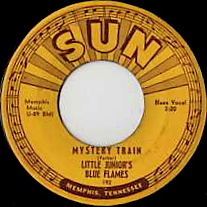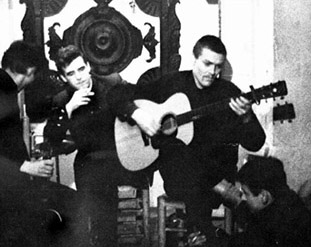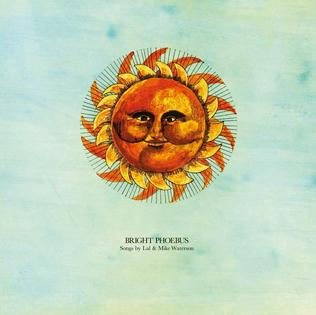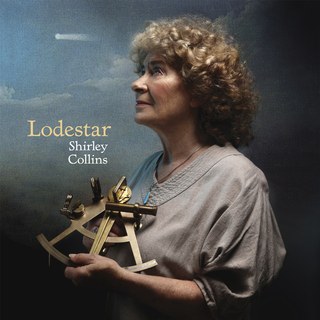Folk rock is a genre of rock music with heavy influences from English folk and American folk music. Combining the elements of folk and rock music, it arose in the United States, Canada, and the United Kingdom in the mid-1960s. In the U.S., folk rock emerged from the folk music revival. Performers such as Bob Dylan and the Byrds—several of whose members had earlier played in folk ensembles—attempted to blend the sounds of rock with their pre-existing folk repertoire, adopting the use of electric instrumentation and drums in a way previously discouraged in the U.S. folk community. The term "folk rock" was initially used in the U.S. music press in June 1965 to describe the Byrds' music.

Heavy metal fashion is the style of dress, body modification, make-up, hairstyle, and so on, taken on by fans of heavy metal, or, as they are often called, metalheads or headbangers. While the style has changed from the 1970s to the 2020s, certain key elements have remained constant, such as black clothes, long hair and leather jackets. In the 1980s, some bands began wearing spandex. Other attire includes denim or leather vests or jackets with band patches and logos, t-shirts with band names, and spiked wristbands.

Herbert Jansch was a Scottish folk musician and founding member of the band Pentangle. He was born in Glasgow and came to prominence in London in the 1960s as an acoustic guitarist and singer-songwriter. He recorded more than 28 albums and toured extensively from the 1960s to the 21st century.
Shirley Elizabeth Collins MBE is an English folk singer who was a significant contributor to the English Folk Revival of the 1960s and 1970s. She often performed and recorded with her sister Dolly, whose accompaniment on piano and portative organ created unique settings for Shirley's plain, austere singing style.
Sunshine pop is a subgenre of pop music that originated in Southern California in the mid-1960s. Rooted in easy listening and advertising jingles, sunshine pop acts combined nostalgic or anxious moods with "an appreciation for the beauty of the world". The category largely consists of lesser-known artists who imitated more popular groups such as the Mamas & the Papas and the 5th Dimension. While the Beach Boys are noted as prominent influences, the band's music was rarely representative of the genre.

"Mystery Train" is a song written and recorded by American blues musician Junior Parker in 1953. Originally performed in the style of a Memphis blues or rhythm and blues tune, it was inspired by earlier songs and later became a popular rockabilly song, as first covered by Elvis Presley, then numerous others.

David Michael Gordon "Davey" Graham was a British guitarist and one of the most influential figures in the 1960s British folk revival. He inspired many famous practitioners of the fingerstyle acoustic guitar such as Bert Jansch, Wizz Jones, John Renbourn, Martin Carthy, John Martyn, Paul Simon and Jimmy Page, who based his solo "White Summer" on Graham's "She Moved Through the Fair". Graham is probably best known for his acoustic instrumental "Anji" and for popularizing DADGAD tuning, later widely adopted by acoustic guitarists.
Americana is an amalgam of American music formed by the confluence of the shared and varied traditions that make up the musical ethos of the United States of America, with particular emphasis on music historically developed in the American South.

fRoots was a specialist music magazine published in the UK between 1979 and 2019. It specialised in folk and world music, and featured regular compilation downloadable albums, with occasional specials. In 2006, the circulation of the magazine was 12,000 worldwide.

"Point Me at the Sky" is the fifth UK single by the English band Pink Floyd, released on 6 December 1968. It was their last single in the UK for nearly a decade. The song was an early collaboration by bassist Roger Waters and guitarist David Gilmour. The single was not released in the US, but was in Canada, Japan, and some European countries.

Folk, Blues and Beyond is the second studio album by British musician Davey Graham, originally released in 1965. It has been considered Graham's most groundbreaking and consistent work and a defining record of the 20th century. It has also been a primary influence on some of the most popular musicians in Britain ranging from Bert Jansch to Jimmy Page and Eric Clapton.
Folk baroque or baroque guitar is a distinctive and influential guitar fingerstyle developed in Britain in the 1960s, which combined elements of American folk, blues, jazz and ragtime with British folk music to produce a new and elaborate form of accompaniment. It has been highly important in folk music, folk rock and British folk rock playing, particularly in Britain, Ireland, North America and France.

Morning Way is a 1970 album by Trader Horne. It was released by Pye Records in 1970. The album was the only release by Trader Horne and sold limited numbers at the time. The album was re-released on CD in 2008 by Esoteric Records. Through the years this LP has reached legendary status and it is considered one of the lost gems of the 1960s..
"The Musical Box" is a song by English progressive rock band Genesis, which was originally released on their third studio album Nursery Cryme in 1971. The song is written in the key of F# major. This song is the longest song on the album at ten and a half minutes.

John Raymond Arthey was a British conductor and composer. He was responsible for arranging many hit pop records in the 1960s and 1970s.
Austin John Marshall was an English record producer, songwriter, poet and graphic artist, most notable for his work in developing folk music in Britain in the 1960s and 1970s. Writer Karl Dallas described him as "one of the great unsung pioneers of contemporary British folk song".

Bright Phoebus, fully titled Bright Phoebus: Songs by Lal & Mike Waterson, is a folk rock album by Lal and Mike Waterson. It was recorded in May 1972 with musical assistance from various well-known members of the British folk rock scene. The album failed to make an impact on its original release, but it was subsequently championed by many musicians, including Billy Bragg, Arcade Fire, Richard Hawley and Jarvis Cocker. For years the album was difficult to obtain. In 2017, a re-release of Bright Phoebus was announced and shortly thereafter pulled from the market for legal reasons.

Lodestar is the seventh studio album by the English folk musician Shirley Collins. The album is Collins's first in 38 years, making it one of the longest gaps between studio albums.
"I Am Damo Suzuki" is a song by the English post-punk band The Fall released on their 1985 album This Nation's Saving Grace. It was written in tribute to the Japanese expat vocalist Damo Suzuki of the Krautrock group Can, whom Fall vocalist Mark E. Smith consistently described as a major influence.

Heart's Ease is the eighth solo studio album by English folk singer Shirley Collins. It was released on 24 July 2020 via Domino Recording Company, a follow-up to her 2016 comeback album Lodestar. Recording sessions took place at Metway Studios in Brighton. Produced by Ian Kearey, the album features contributions from Dave Arthur, Matthew Shaw, Nathan Salsburg, Ossian Brown, Pete Cooper, Pip Barnes, John Watcham and Glen Redman.












